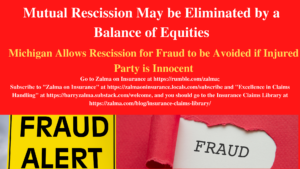Mutual Rescission May be Eliminated by a Balance of Equities


Michigan Automobile Insurance Placement Facility (MAIPF) appealed an unpublished order of the Court of Appeals where the trial court ordered denying MAIPF’s motion for summary disposition and granting defendant, Falls Lake National Insurance Company’s (Falls Lake), motion for summary disposition. In University Of Michigan Regents v. Michigan Automobile Insurance Placement Facility, and Unnamed Assignee Of The MAIPF, Defendant, and Falls Lake National Insurance Company, No. 354808, Court of Appeals of Michigan (January 20, 2022) the Court of Appeal required a defrauded insurer to prove its right to rescission is more fair than the rights of an innocent third party.
FACTS
Sterling Pierson applied for a policy of automobile insurance from Falls Lake to cover his 2003 Chevy Malibu. The application required Pierson to identify, among other things, all household members who were 14 years of age or older and other vehicles he owned. Falls Lake completed the application review and issued a policy of insurance to Pierson not knowing that Pierson lied about facts material to the decision to insure or not insure Pierson.
After Trevino got out of the vehicle, he opened the driver’s side door and attacked Pierson. As a consequence of this fear, Pierson drove away with Trevino clinging to the driver’s side door and being dragged down the street. Trevino sustained serious bodily injuries during these events and was treated for those injuries at a medical facility owned and operated by plaintiff.
Trevino sued. Falls Lake, after conducting an investigation, notified Pierson that his no-fault policy was rescinded because Pierson made two material misrepresentations in his insurance application. Falls Lake also mailed to Pierson a check in an amount sufficient to refund the paid premium on the policy. Importantly, Pierson endorsed and cashed the refund check accepting the rescission.
Plaintiff, as the assignee of Trevino, sued Falls Lake and the MAIPF. According to Falls Lake, it was entitled to summary disposition because it had rescinded its policy of insurance issued to Pierson as a consequence of his misrepresentations, and Pierson had ratified that rescission by accepting the refunded premium. Falls Lake asserted that the rescission rendered the policy void ab initio. Thus, Falls Lake provided no coverage for Trevino’s injuries.
MAIPF argued that Bazzi v Sentinel Ins Co, 502 Mich. 390; 919 N.W.2d 20 (2018), required that the equities be balanced before the policy between Falls Lake, as a defrauded insurer, and Trevino, as an innocent third party, could be rescinded with respect to the innocent third-party’s claims. It further asserted that the equities weighed in favor of Falls Lake retaining liability under the insurance contract as to Trevino and because the insurance coverage supplied by Falls Lake applied to Trevino under this balancing, both Trevino and plaintiff were ineligible for benefits through the assigned claims plan.
The trial court opined that it did not need to balance the equities with respect to innocent third parties and that Falls Lake was not obligated to pay Trevino’s medical bills, but that the MAIPF was so obligated.
ANALYSIS
In Bazzi v Sentinel Ins Co, 502 Mich. 390; 919 N.W.2d 20 (2018) the Michigan Supreme Court recognized that the judicially created innocent-third-party rule, which precluded an insurer from rescinding an insurance policy procured through fraud when such rescission would impact an innocent third party, was abrogated by our Supreme Court’s decision in Titan Ins Co v Hyten, 491 Mich. 547; 817 N.W.2d 562 (2012). An insurance policy procured by fraud may be declared void ab initio at the option of the insurer. While the innocent-third-party rule no longer bars insurers from seeking rescission for fraud in Michigan, insurers are not categorically entitled to rescission. The Michigan Supreme Court stated:
[W]hen two equally innocent parties are affected, the court is required, in the exercise of its equitable powers, to determine which blameless party should assume the loss . . . . [W]here one of two innocent parties must suffer by the wrongful act . . . of another, that one must suffer the loss through whose act or neglect such third party was enabled to commit the wrong. The doctrine is an equitable one, and extends no further than is necessary to protect the innocent party in whose favor it is invoked.
Just as the intervening interest of an innocent third party does not altogether bar rescission as an equitable remedy, neither does fraud in the application for insurance imbue an insurer with an absolute right to rescission of the policy with respect to third parties. To determine the result courts must consider the following factors:
the extent to which the insurer could have uncovered the subject matter of the fraud before the innocent third party was injured;
the relationship between the fraudulent insured and the innocent third party to determine if the third party had some knowledge of the fraud;
the nature of the innocent third party’s conduct, whether reckless or negligent, in the injury-causing event;
the availability of an alternate avenue for recovery if the insurance policy is not enforced; and
a determination of whether policy enforcement only serves to relieve the fraudulent insured of what would otherwise be the fraudulent insured’s personal liability to the innocent third party
The parties do not dispute that Pierson made two material misrepresentations in his application for no-fault insurance. There is also no dispute that Falls Lake and Trevino are blameless parties to Pierson’s material omissions on the insurance application, or that Falls Lake rescinded Pierson’s policy of insurance, and Pierson ratified the rescission.
The rescission was accomplished by mutuality of action, i.e., by return and acceptance of the premium. In Meemic Ins Co v Fortson, 506 Mich. 287, 310 n 19; 954 N.W.2d 115 (2020), the Supreme Court addressed the distinction between the equitable remedy of rescission and the legal remedy of rescission as follows: Before the remedies were merged, proceedings in equity and law were distinct. In equity, however, the rule is not so rigid and the decree will place the parties in status quo, as far as possible. Notwithstanding the distinctions between the equitable remedy of rescission and the legal remedy of rescission, trial courts are required to balance the equities between a defrauded insurer and an innocent third party before extending the mutual rescission of a no-fault insurance policy to an innocent third party.
Rescission, whether legal or equitable, is governed by equitable principles and courts at law have considerable discretion in granting rescission. Thus, like equitable rescission, rescission as a legal remedy is also not a matter of right, but rather is granted in the sound exercise of a trial judge’s discretion. Because the legal underpinnings of equitable rescission and rescission at law are the same, logic dictates that the same rule applies in matters involving rescission at law.
The court concluded, therefore, that remand was necessary in order for the circuit court to balance the equities between Falls Lake, as a defrauded insurer, and Trevino, as an innocent third party.
Rescission, by definition means that the policy never existed. Both Falls Lake and its insured agreed to the rescission. The Michigan court, ignoring the fact of the fraud, now requires the trial court to determine who is hurt more, the defrauded insurer or the innocent third party. The answer should be obvious; no one should be allowed to profit from fraud. The innocent injured person loses no rights against the person who injured him – he can sue and collect from whatever assets the driver has. Neither have a right to insurance. If the court weighs the equities and makes the insurer pay for a policy that does not exit is a failure to understand reality and impose on an insurer the payment of a claim for which it obtained no premium and the court will victimize it again rather than impose the costs on the fraud perpetrator.

© 2022 – Barry Zalma
Barry Zalma, Esq., CFE, now limits his practice to service as an insurance consultant specializing in insurance coverage, insurance claims handling, insurance bad faith and insurance fraud almost equally for insurers and policyholders.
He practiced law in California for more than 44 years as an insurance coverage and claims handling lawyer and more than 54 years in the insurance business.
Subscribe to “Zalma on Insurance” at https://zalmaoninsurance.locals.com/subscribe and “Excellence in Claims Handling” at https://barryzalma.substack.com/welcome.
You can contact Mr. Zalma at https://www.zalma.com, https://www.claimschool.com, zalma@claimschool.com and zalma@zalma.com . Mr. Zalma is the first recipient of the first annual Claims Magazine/ACE Legend Award.
You may find interesting the podcast “Zalma On Insurance” at https://anchor.fm/barry-zalma; you can follow Mr. Zalma on Twitter at; you should see Barry Zalma’s videos on https://www.youtube.com/channel/UCysiZklEtxZsSF9DfC0Expg/featured; or videos on https://rumble.com/zalma. Go to the Insurance Claims Library – https://zalma.com/blog/insurance-claims–library/ The last two issues of ZIFL are available at https://zalma.com/zalmas-insurance-fraud-letter-2/
Like this:
Loading…







